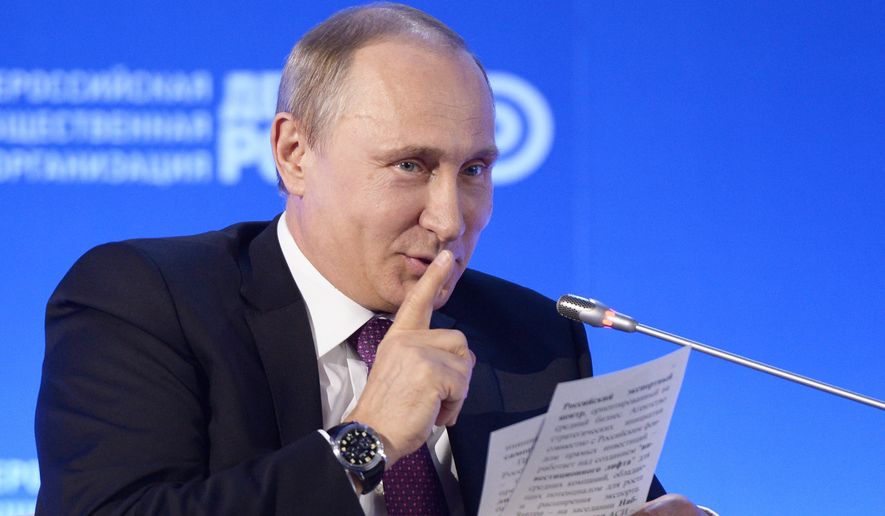MOSCOW — Anti-Americanism is on the rise in Russia, and the consequences are sometimes lethal.
Late last week, a 45-year-old Russian beat an acquaintance to death with his fists after a drinking session in Yaroslavl, a city some 160 miles from Moscow. The motive? The victim revealed he often traveled abroad, and his vodka-frazzled assailant told police that he thought he was neutralizing “an American spy.”
This may be an extreme case, but attitudes toward the United States have never been worse in post-Soviet Russia. An opinion poll published by the independent, Moscow-based Levada Center this year indicated that just over 80 percent of Russians have negative views of the United States, a figure that has almost doubled in slightly over a year. Similar figures also were recorded for attitudes toward European countries.
It is a trend that began in late 2011, when Russian President Vladimir Putin publicly accused the United States — specifically Secretary of State Hillary Rodham Clinton — of being behind unprecedented protests in Moscow against his long rule.
“In the following months, the term ’GosDep’ (the Russian acronym for the U.S. State Department) became a political slur that stood for the ’evil America’ that was plotting against Russia,” Maria Lipman, a Moscow-based analyst, wrote in a recent article for the European Council on Foreign Relations.
That protest movement has long been quashed, but state television and senior politicians continue to demonize the United States against the backdrop of war in Ukraine, where Washington is frequently portrayed as seeking to establish military bases as part of a plan to encircle Russia.
The feeling is mutual. A Gallup poll this year found negative American sentiment toward Russia at a post-Cold War high, with 70 percent unfavorable and 24 percent favorable.
In a fiery broadcast last year, Dmitry Kiselyov, a presenter on one of Russia’s top TV shows, reminded viewers that his country was the only one in the world capable of “turning the United States into radioactive dust.” Mr. Kiselyov also stated on prime-time television that Russia reserved the right to a preemptive nuclear strike against the United States if it thought its sovereignty was in danger.
The message that the United States has become Russia’s avowed enemy was further reinforced last week when the head of Russia’s Security Council, Nikolai Patrushev, said in an interview with a Russian government newspaper that Washington “would like it if Russia did not exist as a state at all.”
Conspiracy theories
This atmosphere of hostility and suspicion in the popular media has given birth to wild conspiracy theories.
“The United States wants to kill me and hang my child,” Yevgeny Fyodorov, a lawmaker from Mr. Putin’s ruling United Russia party, told The Washington Times, when asked to explain rising anti-American attitudes. Mr. Fyodorov, who also heads the ultranationalist National Liberation Movement, believes that the United States has “agents of influence” within the Russian government and that Mr. Putin is fighting to “free Russia” from Washington’s behind-the-scenes control, which he says was established in the immediate post-Soviet era. He also said Russia’s beleaguered opposition is a Western-backed “fifth column” looking to undermine the state from within.
On top of this, the Foreign Ministry has repeatedly warned Russian citizens against traveling abroad, where U.S. special services are, it claims, “hunting” for them. A leading United Russia lawmaker, Irina Yarovaya, spoke out recently against the study of foreign languages, claiming the practice hurt “Russia’s traditions” while the killing of opposition politician Boris Nemtsov in February was said by Kremlin supporters to be a CIA plot to spark unrest in Russia.
Opposition figures say Mr. Putin is encouraging such attitudes in a bid to maintain his power base and personal popularity in the face of a worsening economic situation triggered in part by Western sanctions over Russia’s actions in Ukraine, as well as low global prices for oil.
“The Kremlin is attempting to create an external enemy in order to distract the population from Russia’s increasing internal problems,” Dmitry Gudkov, one of a handful of genuine opposition lawmakers in Russia’s parliament, told The Washington Times.
But Mr. Gudkov also expressed doubt that anti-Americanism is as high as opinion polls suggest.
“There can be no such thing as sociology in an authoritarian society,” he said. “People are afraid and simply give the answers expected of them.”
He also pointed to the massive popularity in Russia of Apple products, “not to mention the massive queues at McDonald’s,” as proof that much of the anti-Americanism is only surface-deep.
Yet even McDonald’s has been forced to play down its roots. The company, one of the first foreign businesses to open in Moscow, started an advertising campaign this year emphasizing its local ties and its long history in Russia. “Made in Russia, for Russians,” read a McDonald’s billboard in central Moscow.
For many Russians with positive attitudes toward the United States, the prevailing attitudes mean they often have to bite their tongues.
“I try to avoid speaking politics with lots of my old friends and acquaintances,” said Alexei, a Moscow-based businessman who requested that his surname not be printed. “Many of them have just been brainwashed into thinking that American officials spend all day dreaming up ways to harm Russia. It’s simpler — and a lot safer — not to discuss such things with them.”




Please read our comment policy before commenting.